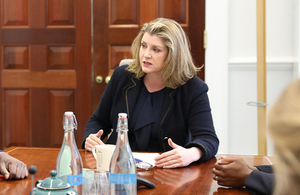Period Poverty Taskforce - Minister announces next steps on Menstrual Hygiene Day
On Menstrual Hygiene Day (28 May) Minister for Women and Equalities, Penny Mordaunt, has announced two co-chairs to help lead the government’s new Period Poverty Taskforce.

- Taskforce to be co-chaired by Plan International UK, Procter & Gamble and Minister for Women & Equalities, Penny Mordaunt
- Group to tackle stigma and education around periods, alongside accessibility of period products
- News comes after recent government announcements on free period products in schools, hospitals and police custody
Plan International UK, Procter and Gamble, and the Government Equalities Office (GEO) will work together with charities and businesses across a range of sectors to develop a comprehensive and sustainable response to period poverty in the UK.
In recent months the government has announced that period products in schools, hospitals and police custody will be free for women and girls. Taskforce will build on this work, looking at where accessibility is an issue for women and girls, but also seeking to tackle the issue of stigma and education around periods.
Research from co-chair of the Taskforce, Plan International UK highlights that tackling stigma and shame around periods is just as important as creating access to related products, the research shows:
- 71% of girls reported that they had felt embarrassed when buying period products,
- 1 in 7 even girls have also admitted that they “didn’t know what was happening” when they started their periods
- 27% of girls have overused a sanitary product as they couldn’t afford a fresh one
Minister for Women and Equalities, Penny Mordaunt said:
“For too long women and girls in the UK have faced unnecessary adversity around their periods, that is why we have formed this new Taskforce.
“Our two new co-Chairs, Plan International UK and Procter & Gamble, have already produced impressive work around the country to improve access to period products and change old-fashioned attitudes to menstruation and break down taboos.
“Now, working together on the Period Poverty Taskforce, we can take action to create a strong and viable solution to period poverty in the UK.”
Tanya Barron, Chief Executive at Plan International UK, said:
“We warmly welcome the chance to co-chair the Government’s new Taskforce committed to tackling period poverty and stigma.
“This is a golden opportunity to tackle the root causes of period poverty here in the UK, namely the high-cost of period products, lack of education and the stigma and shame that surrounds periods.
“As co-chairs, we’ll be working hard to make sure the voices of UK girls are heard and that any course of action reflects their needs and concerns. Together we can put an end to period poverty and stigma once and for all.”
Aimee Goldsmith, Company Communications Director, Procter & Gamble Northern Europe said:
“Always aims to champion girls’ confidence through puberty education, access to products and tackling societal barriers. This ambition is in line with the Government’s new Taskforce initiative and we feel privileged to be able to work together to eliminate period poverty in a sustainable way.
“We look forward to co-chair the Taskforce and partner with all participants across sectors to build on the breadth of knowledge and experience, in order to empower girls in the UK to unleash their full potential. Without period poverty and taboos holding them back.”
The Taskforce will also look at the evidence and data around how period poverty affects different groups in society, as well as considering the role of education, access, costs, communications and role models in shifting social attitudes.
Alongside Plan International and Procter & Gamble the Taskforce will include members from grass-root organisations, businesses, public bodies and consult with academics, social enterprises, retailers and manufacturers, using their expertise to drive this vital work.
Further information:
Research by Plan International found that:
- 79% of girls and young women have experienced symptoms linked to their period that concerned them but they haven’t seen a doctor or health professional
- 27% haven’t seen a doctor or health professional about their concerns because they felt too embarrassed
- 22% in the UK feel comfortable talking about their period with their teacher
- One in 10 girls have been asked not to talk about their periods with their mother
Notes to Editors:
- Announced shortly before International Women’s Day, the Taskforce is the first of its kind in the UK. It will meet for the first time shortly
- The Taskforce areas are: tackling stigma and shame through education, working on data and evidence, and improving access to period products for all women and girls
- Minister for Women and Equalities, Penny Mordaunt launched the seed-funding for the Period Poverty Taskforce in March this year. Her speech can be found here in full
- Plan International data comes from Opinium Research of representative weighted sample of 1,000 girls and young women aged 14-21, carried out online between 22-24 August 2017 and 23 February to 2 March 2018